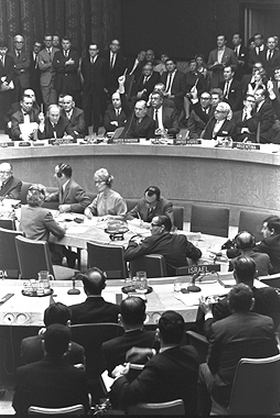November 22, 1967
In the wake of the June 1967 war, the U.N. Security Council adopts Resolution 242. The resolution becomes the context and framework for subsequent Arab-Israeli negotiations. The central concept in the resolution is an Israeli exchange of land won in the 1967 war — the Sinai Peninsula, the Golan Heights, portions of Jerusalem, the West Bank and the Gaza Strip — for peace with Arab neighbors and states.
The resolution includes that formula for peace without establishing specifically how much land should be returned for what nature of peace. Resolution 242 calls for “withdrawal of Israeli armed forces from territories occupied in the recent conflict,” without specifying the extent of the withdrawal, in the belief that the respective sides will decide the final borders through negotiations. Some believe that any withdrawal from any of the captured territories would satisfy the resolution’s requirements. Others take the view that withdrawal in 242 refers to every area Israel won in June 1967.
On the other hand, the resolution is specific in its call for the “termination of all claims or states of belligerency and respect for and acknowledgment of the sovereignty, territorial integrity, and political independence of every State in the area and their right to live in peace within secure and recognized boundaries free from threats or acts of force.” Resolution 242 also affirms the need for “guaranteeing freedom of navigation through international waterways in the area, and for achieving a just settlement of the refugee problem.”
Though the resolution is drafted in English, it is the French translation that Arab states and supporters of full Israeli withdrawal cite as the proper meaning and only interpretation of 242. The reason is simple: In French, the key phrase “withdrawal of Israeli armed forces from territories occupied in the recent conflict” is translated as “retrait des forces arrives Isreliennes des territories occupes lores due recent conflit.” The English version intentionally omits the definite article “the” before the word “territories,” leaving imprecise the amount or whereabouts of territory from which Israel might be expected to withdraw.
By contrast, the French text, because of the requirement in the French language to have an article before a noun, necessitates the phrase “de territories,” specifying “the” territories, which is often presented by supporters of total Israeli withdrawal as “the territories” or, even more inaccurately, “from all the territories.”
The United States’ U.N. representative, Arthur Goldberg, and the British representative, Lord Carradon (Hugh Foot), play instrumental roles in the resolution’s unanimous passage. Both held interesting positions earlier in their careers as public servants: Goldberg had been a U.S. Supreme Court justice, and Carradon had his first posting in Palestine in the 1930s as an administrative official serving in Nablus.









